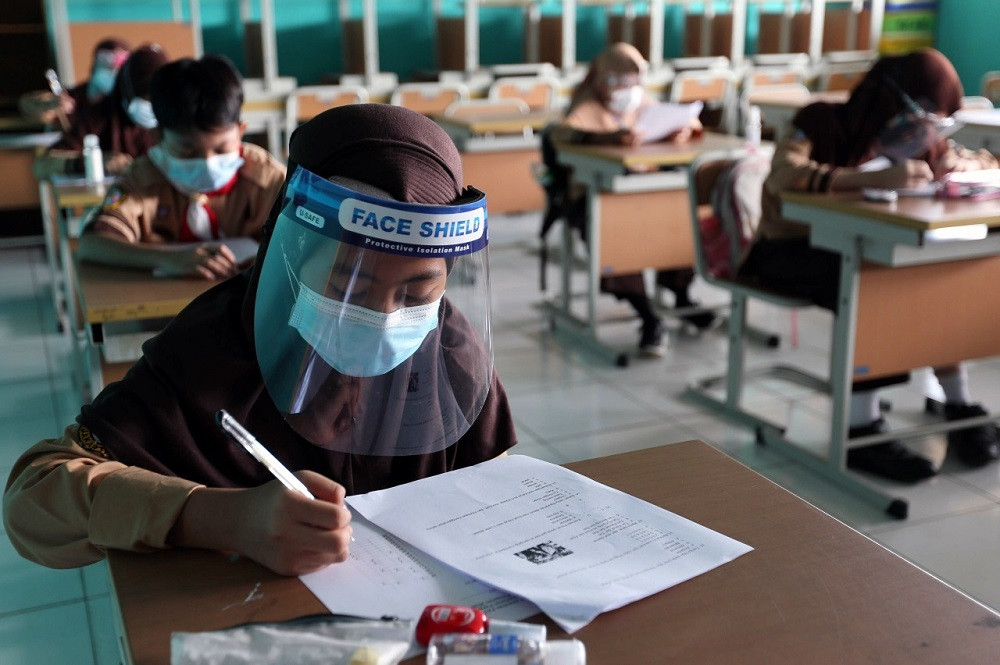Popular Reads
Top Results
Can't find what you're looking for?
View all search resultsPopular Reads
Top Results
Can't find what you're looking for?
View all search resultsGive children a shot
We can barely get children to stay put, let alone control who they interact with inside and outside the classroom, so as long as the medical community can assure us that vaccines are safe, parents should do the responsible thing of inoculating them. Just as we already have done with smallpox or polio vaccines.
Change text size
Gift Premium Articles
to Anyone
 Trial run: Students of SD Kalisari 01 state elementary school in East Jakarta take their exams during a trial program for in-class learning on June 9, after a year of online instruction. The government planned to reopen schools for the new academic year in July, despite growing concerns about the children’s safety as infections soar. (JP/P.J. Leo)
Trial run: Students of SD Kalisari 01 state elementary school in East Jakarta take their exams during a trial program for in-class learning on June 9, after a year of online instruction. The government planned to reopen schools for the new academic year in July, despite growing concerns about the children’s safety as infections soar. (JP/P.J. Leo)
A
s authorities begin to relax COVID-19 mobility curbs around the country, parents of school-age children may be tempted to see it as a sign that things have finally gone back to normal.
As the new month arrives, Indonesia’s daily new infections have dropped from the peak of 56,757 cases on July 15 to just 1,690 cases as of Sept. 30. Nationwide, the number of active cases (36,141) is also slowing, as is the daily rate of fatalities, which hovers at around 100 deaths per day.
For parents, pandemic measures are now lax enough to allow the majority of children to go back to learning at school, after more than a year of distance education that has taught all of us about the importance of teachers.
But just because something can be done, it does not mean it should be done – at least until COVID-19 vaccines are given the green light for children under 12 and, more importantly, we can reliably mitigate the risks of another deadly wave.
From the 45 million school-age children who have joined the 2020/2021 academic year in the country, more than half (25 million) are under the age of 13, according to official education statistics.
At the moment, COVID-19 vaccinations for minors are only allowed for children ages 12 to 17, which means that less than a quarter of all pupils have an effective defense against the coronavirus aside from the natural means by which children can develop immunity.
Even then, only 12.2 percent of the 26.71 million minors targeted have been fully vaccinated as of Sept. 18.
According to a survey by the Indonesian Child Protection Commission (KPAI) published about a month ago, about 30 percent of children in this age group who had not been vaccinated cited various reasons for it, including not getting permission from their parents. Another 59 percent surveyed said they had just not gotten round to it.
But it is important to understand that the problem with vaccinating minors has more to do with the fact that they can still act as effective vectors of transmission, especially when we consider most Indonesians still live in communal or assisted multigenerational households.
The truth is, we can barely get children to stay put, let alone control who they interact with inside and outside the classroom, so as long as the medical community can assure us that vaccines are safe, parents should do the responsible thing of inoculating them. Just as we already have done with smallpox or polio vaccines.
As we wait until the Pfizer vaccine is given the green light for younger minors – it is currently the only available jab proven safe for children ages five to 11 – the government would do well to increase its options before another wave of infections washes over the country. Decision-makers should also do their best to improve distance learning and seize on this opportunity to properly digitalize the education sector.
The proof is in the pudding – as many as 1,299 school infection clusters were discovered since nationwide school reopening trials commenced, and the majority (584) were found at primary schools where pupils still cannot get inoculated.
Parents still have the final say on whether they want to send their kids back to school, even as officials insist on school reopening to offset the risk of loss of learning. But we should be safe as long as we give the children a shot – or two.








